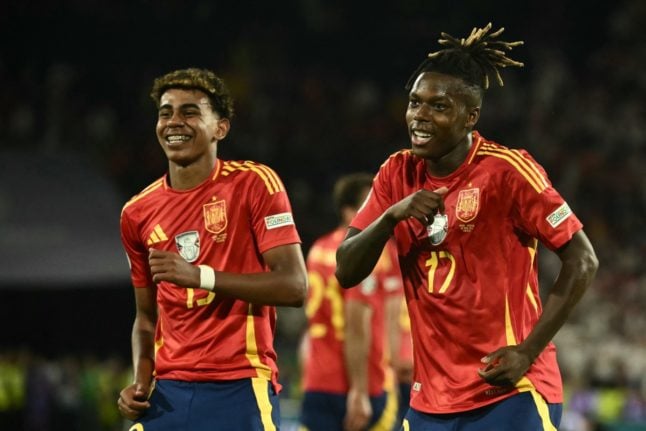Robin Le Normand’s own goal gave Georgia a shock lead in the 18th minute of this last-16 tie to send their noisy supporters wild in Cologne.
It was the first goal Spain had conceded at the competition but they came back to equalise six minutes before the interval courtesy of Manchester City midfielder Rodri.
Ruiz then headed home in the 51st minute and Williams ran through for the third before substitute Olmo made sure of the win as La Roja stay on track to become European champions for the fourth time.
🪩 Bailad, mis niños, BAILAD LO QUE QUERÁIS.
🇪🇸 🆚 🇬🇪 | 4-1 | 87’#VamosEspaña | #EURO2024 pic.twitter.com/gdAxtrEMcv
— Selección Española Masculina de Fútbol (@SEFutbol) June 30, 2024
“There are things we need to improve and at some points in the game we were not forceful enough, but in general terms we were superior,” said Rodri.
Spain now take on Germany in the last eight in Stuttgart on Friday in a repeat of the Euro 2008 final, which they won 1-0 to begin their golden era of dominance in international football.
“Germany might be playing at home but we are not afraid. We are here to win, not just to play well or give off a good image,” Rodri added.
Luis de la Fuente’s team are looking to bring back the glory days and they were expected to brush Georgia aside here.
They would have ultimately won by a far greater margin had they converted more of their chances, with 16-year-old winger Lamine Yamal squandering several opportunities in his attempt to become the youngest ever goal-scorer at the Euros.
¡Imparable la @SEFutbol!
España entera ha vibrado con vosotros.
¡A cuartos!
— Pedro Sánchez (@sanchezcastejon) June 30, 2024
Georgia are ranked 74th in the world, 66 places below Spain. Willy Sagnol’s team lost twice to Spain in qualifying, going down 7-1 at home and 3-1 away.
Yet they still qualified for a first major tournament and then made it to the knockout stages with a stunning 2-0 win over Portugal. They now go home with their heads held high despite eventually crumbling here.
“I am not saying we are disappointed but we are a bit sad because we lost,” Sagnol said.
“I am sure in some days we will realise exactly what we have done and the happiness will come back very quickly.”
They have a lively attacking partnership between Khvicha Kvaratskhelia and Georges Mikautadze that is a danger for any opponent, and Giorgi Mamardashvili has been one of the best goalkeepers at the tournament.
Audacious
Mamardashvili had already saved from Pedri and kept out Dani Carvajal’s glancing header before Georgia went ahead.
The move started with a fine piece of play by Kvaratskhelia on the left, as he picked out a pass for Mikautadze, who then released Otar Kakabadze on the right wing.
Kakabadze’s cross into the box was a horrible one for Le Normand, who had Kvaratskhelia arriving behind him and could not stop the ball rebounding off him and into the net for the eighth own goal of Euro 2024.
Spain were now vulnerable to the counterattack, which is Georgia’s strength, but the men in red continued to dominate the game and kept testing Mamardashvili.
The Valencia shot-stopper made several more interventions in an increasingly wild encounter before the equaliser came, Rodri controlling a Williams pass at the edge of the box and stroking the ball into the corner.
It felt as if that might be that for Georgia, but they remained audacious on the break, with Kvaratskhelia almost scoring from inside his own half at the beginning of the second period, his shot going just wide with goalkeeper Unai Simon out of position.
Spain went ahead shortly after, as Yamal crossed from the right for Ruiz to head in his second goal of the tournament.
Yamal didn’t just miss chances of his own, as he also forced an own goal which was disallowed for offside before Georgia fell apart defensively under increasingly heavy rain.
Ruiz released Williams, who ran from inside his own half, skipped past Giorgi Gvelesiani into the box and fired into the roof of the net to make it 3-1 on 75 minutes.
A delightful control and finish from the edge of the box by Olmo completed the scoring with seven minutes left.



 Please whitelist us to continue reading.
Please whitelist us to continue reading.
Member comments